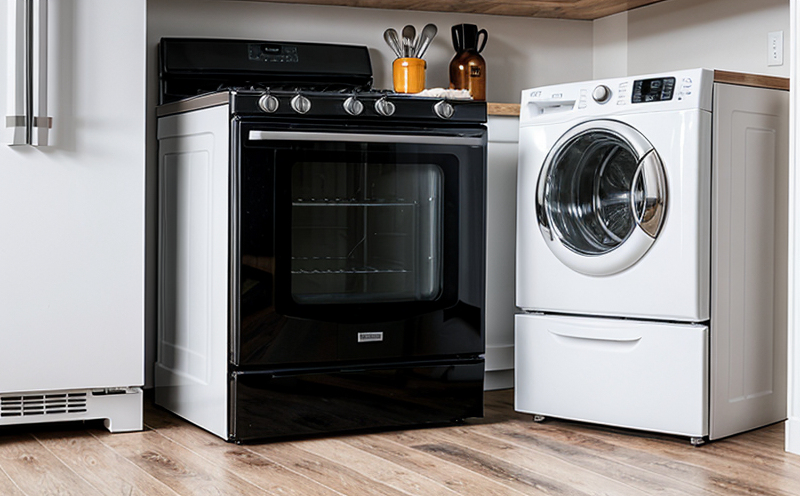Charger Safety Testing in Household Appliances
The safety of household appliances is paramount to consumer protection and regulatory compliance. Chargers used within these devices play a critical role as they are often the first point of contact between the user and the appliance, and any malfunction can lead to electrical hazards or fires. Charger safety testing ensures that all chargers meet industry standards and protect users from potential risks.
Charger safety testing encompasses a wide range of parameters including insulation resistance checks, temperature rise during operation, voltage regulation, and durability under stress conditions. These tests are designed to ensure the charger can operate safely within its intended environment without causing harm or damage.
The process involves rigorous procedures where specimens are subjected to various stresses such as overcharging, short-circuiting, and exposure to environmental factors like humidity and temperature variations. Compliance with international standards such as ISO, ASTM, and local regulations is crucial for market access.
Quality managers must ensure that all chargers used in household appliances are thoroughly tested to prevent non-compliance issues. This not only protects the end-users but also safeguards the reputation of the manufacturer. Proper testing helps identify potential risks early on, allowing for necessary design modifications before product launch.
In summary, charger safety testing is essential for ensuring that all components within household appliances operate safely and reliably under expected conditions. Compliance with relevant standards ensures both consumer protection and regulatory compliance.
Why It Matters
Charger safety testing in household appliances is critical because it directly impacts the health and well-being of consumers worldwide. Non-compliance can lead to dangerous situations such as electrical fires, burns, or even fatalities. Regulatory bodies around the globe have stringent requirements for charger safety due to the high risk associated with these components.
Consumer trust is built on reliability and safety; therefore, manufacturers must adhere strictly to testing protocols. Failure to do so could result in product recalls, legal actions, and significant financial losses. Moreover, meeting regulatory expectations enhances brand reputation and fosters consumer confidence.
- Compliance with international standards minimizes the risk of accidents.
- Promotes reliability and longevity of products.
- Fosters trust among consumers regarding product safety.
By investing in thorough charger safety testing, manufacturers can ensure their products meet stringent safety requirements. This proactive approach not only protects end-users but also reduces potential liabilities for the company involved.
Eurolab Advantages
Eurolab offers comprehensive services tailored to meet the unique needs of manufacturers in the consumer product and household appliance sectors. Our team of experts ensures that every charger undergoes rigorous testing, guaranteeing compliance with relevant international standards.
- State-of-the-art Facilities: Equipped with advanced equipment capable of simulating real-world conditions to accurately assess performance.
- Expertise & Experience: Our team comprises highly skilled professionals who stay updated on the latest industry trends and regulatory changes.
- Compliance Assurance: Ensures that all chargers meet strict safety requirements, avoiding costly delays or non-compliance issues.
In addition to our technical capabilities, Eurolab provides tailored solutions that address specific challenges faced by manufacturers. We offer flexible testing schedules and customized reports designed for easy integration into existing quality assurance processes.
Our commitment to excellence sets us apart from other labs, making us the preferred choice for top-tier brands seeking reliable and accurate testing results.
Competitive Advantage and Market Impact
Eurolab’s commitment to charger safety testing provides significant competitive advantages in the market. By ensuring compliance with international standards, we help our clients stay ahead of regulatory requirements, reducing the risk of non-compliance penalties.
- Innovation Leadership: Our expertise enables manufacturers to innovate confidently knowing their products meet stringent safety criteria.
- Better Customer Satisfaction: Safe and reliable chargers enhance customer satisfaction, leading to increased loyalty and positive reviews.
- Cost Savings: Early detection of potential issues through comprehensive testing helps avoid costly product recalls later on.
In today’s competitive market, being able to demonstrate adherence to high safety standards can be a decisive factor in gaining market share. Eurolab supports manufacturers in achieving this goal by providing reliable and accurate test results backed by extensive experience and cutting-edge facilities.





